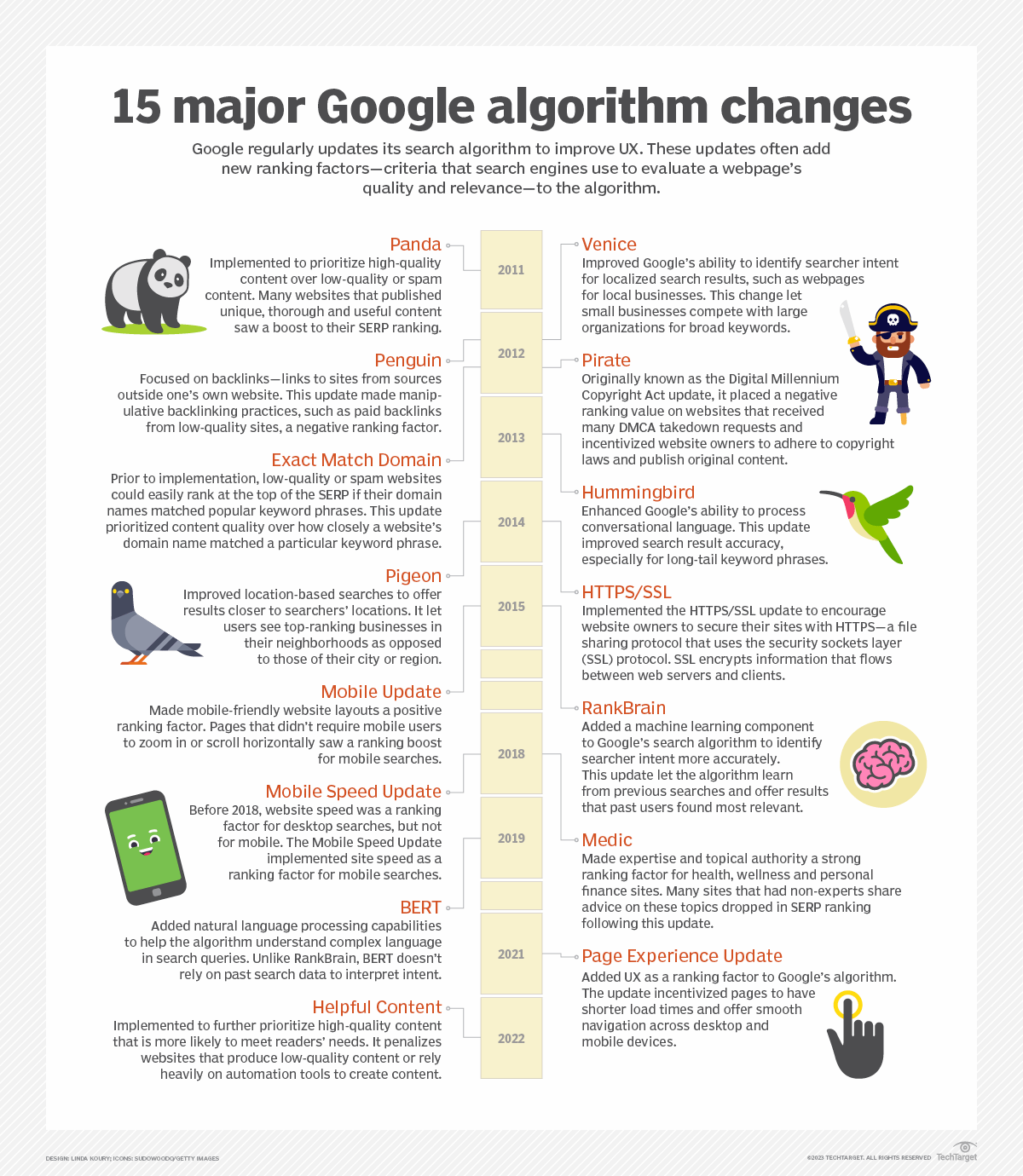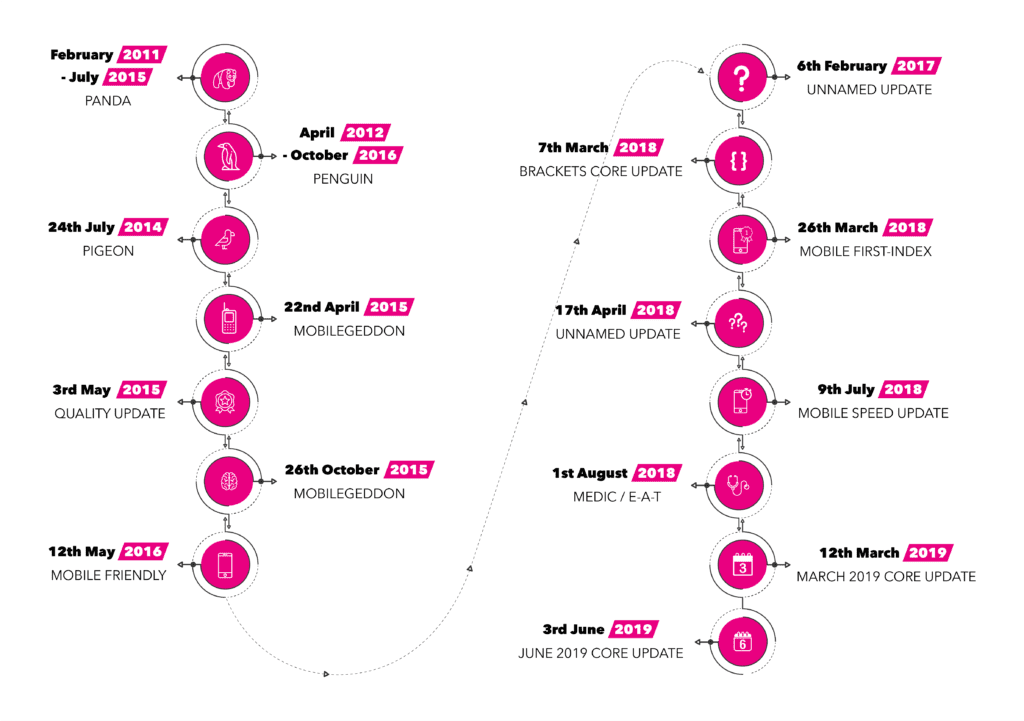Browsing Google's Algorithm Updates: SEO Approaches Introduced
Browsing Google's Algorithm Updates: SEO Approaches Introduced
Blog Article
Comprehending the Effects of Google's Formula Updates on Search Engine Optimization Rankings and strategies
In the ever-evolving landscape of search engine optimization (SEO), the implications of Google's formula updates have become a prime focus for marketing experts and companies aiming to preserve or enhance their on the internet presence (Google’s Algorithm Updates). As Google remains to improve its formulas to provide customers with one of the most premium and appropriate search results, understanding exactly how these updates impact SEO strategies and rankings is extremely important. From the refined shifts in keyword techniques to the much more obvious focus on individual experience, the interplay between algorithm updates and SEO techniques introduces an intricate internet of factors to consider that demand constant watchfulness and flexibility
Advancement of Google's Formula

The Panda upgrade, introduced in 2011, targeted low-quality material and penalized internet sites with replicate, slim, or pointless material. Penguin, released a year later, resolved link spam by devaluing manipulative links. Hummingbird, presented in 2013, marked a change in the direction of semantic search, recognizing the context and intent behind user questions instead of just matching search phrases.
These updates required web site owners and search engine optimization experts to focus on individual experience, high quality web content, and all-natural link structure methods to improve their positions in Google's search results page. The evolution of Google's formula highlights the online search engine's dedication to supplying beneficial and relevant web content to individuals while penalizing methods intended exclusively at gaming the system.
Effect On Key Phrase Strategy
With the development of Google's formula in the direction of prioritizing user experience and web content relevance, the Effect on Keyword Strategy has come to be significantly crucial for web site owners and search engine optimization specialists seeking to line up with these internet search engine updates. Key phrases are no much longer practically matching search terms yet recognizing customer intent and delivering valuable material. Google's updates, such as BERT and RankBrain, focus on all-natural language processing and context, making keyword strategy much more sophisticated.

Moreover, with Google's emphasis on semantic search and user-focused web content, key phrase stuffing is no much longer effective and can also hurt positions. Rather, incorporating keywords normally into high-grade, appropriate web content is essential. By recognizing the impact of Google's formula updates on search phrase strategy, web site owners can enhance their SEO efforts and boost their visibility in search outcomes.
Adjustments in Content Optimization
As the landscape of search engine optimization remains to progress, web site owners and SEO specialists are seeing significant changes in content optimization methods. In the wake of Google's algorithm updates, there has actually been an expanding focus on developing premium, appropriate, and authoritative material that provides worth to users. This means that merely packing key phrases into posts is no much longer reliable; instead, content has to be well-written, interesting, and tailored to fulfill the needs of the target market.
Furthermore, there is a better emphasis on individual experience and fulfillment, with search visit homepage engines satisfying web sites that supply a seamless browsing experience and important details. As a result, web content optimization currently includes not just including pertinent key phrases naturally however additionally structuring material in a way that is very easy to navigate and read.
Relevance of User Experience
Enhancing customer experience on an internet site is vital in contemporary SEO practices, working as a critical consider identifying a site's exposure and success in online search engine rankings. Customer experience includes numerous elements such as site rate, mobile-friendliness, user-friendly navigation, and engaging material (Google’s Algorithm Updates). Google's algorithms progressively focus on websites that offer a smooth and enjoyable user experience, as it directly correlates with customer complete satisfaction and retention
A positive user experience not just improves a site's search engine optimization efficiency yet additionally adds to greater conversion rates and consumer commitment. Websites that are simple to navigate, visually appealing, and give beneficial web content are most likely to draw in and retain site visitors. On the other hand, web sites with bad customer experience metrics might endure from high bounce rates and reduced dwell times, signifying to internet search engine that the content might not be interesting or pertinent for individuals.
Therefore, purchasing maximizing customer experience is vital for maintaining an one-upmanship in the ever-evolving electronic landscape. By focusing on user-centric style and capability, web sites can improve their online search engine positions and inevitably drive even more organic traffic and conversions.
Techniques for Future Adaptation
Progressing in the swiftly progressing landscape of search engine optimization, it is crucial for companies to adopt ingenious methods for future adaptation. One key technique is to concentrate on developing premium, relevant material that supplies value to users. This web content ought to be enhanced for search phrases that line up with individual intent and ought to be regularly upgraded to remain competitive and current.
Furthermore, organizations must prioritize mobile optimization to satisfy the increasing number of users accessing the internet by means of mobile tools. Making certain that internet sites tons quickly, are simple to navigate, and give a seamless individual experience on mobile phones can aid enhance search positions and user complete satisfaction.
Moreover, leveraging information analytics and user actions understandings can help organizations comprehend their target market much better and customize their next page SEO techniques appropriately. By monitoring crucial efficiency signs and changing methods based on data-driven understandings, services can stay in advance of the contour and adapt to the ever-changing SEO landscape. Accepting arising innovations, such as voice search optimization and synthetic intelligence, can also be beneficial for future-proofing SEO strategies.
Final Thought

With the evolution of Google's algorithm in the direction of prioritizing user experience and content importance, the Effect on Key phrase Approach has actually come to be increasingly vital for website proprietors and SEO professionals looking for to straighten with these search engine updates. Google’s Algorithm Updates. Keywords are no much longer just concerning matching search terms but recognizing customer intent and providing useful web content. Google's algorithms significantly focus on sites that offer a smooth and pop over to this site rewarding user experience, as it directly associates with user complete satisfaction and retention
In contrast, internet sites with inadequate individual experience metrics may suffer from high bounce rates and low dwell times, signifying to search engines that the content may not be engaging or appropriate for individuals.
The advancement of the algorithm has moved focus in the direction of customer experience and top quality content, affecting keyword technique and material optimization.
Report this page